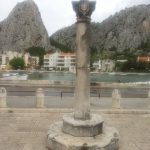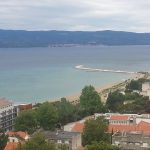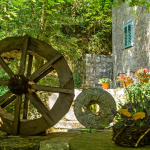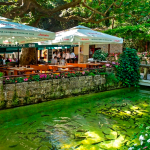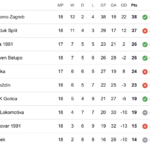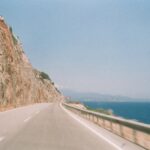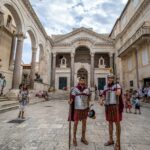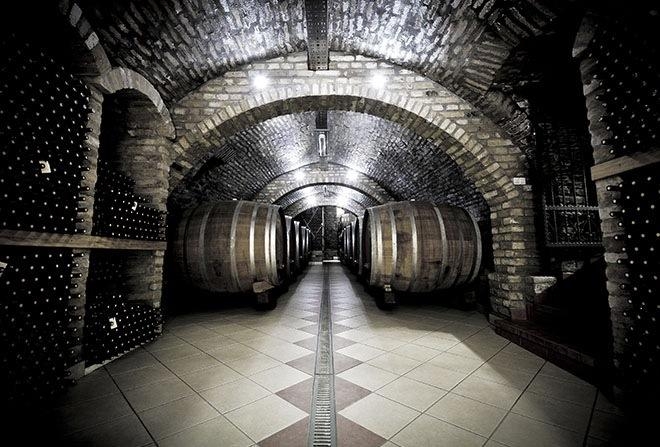
“The first serious money Dario earned he spent in vineyards, equipment and winery building, and he could have spent it on luxury.”
I planned a visit to Krešić Cellars since the end of March when I was in Ilok for a wine tourism conference organised by the G.E.T. table couture association. I was impressed that the winery is located right along the Danube, as well as by the news of successes at international wine competitions.
The Krešić Cellars winery is owned by the Krešić family: spouses Franjo and Irenka and son Dario. It began to operate in 2006. The core of today’s winery is the vineyard of Irenka’s father in Opatovac. They started out with it in 2006, and with gradual enlargement they arrived to the current twenty hectares. The first acquisition was a vineyard right along the starting one. Today it is an imposing complex which includes a new winery at a technologically enviable level, as well as a tasting room, and a restaurant and hotel in construction. Besides the wine story, Krešić Cellars are promoting a touristic one. They cultivate over one hundred vines on positions near Opatovac and Šarengrad, offering five white (Graševina, Chardonnay, Pinot Gris, Green Silvaner, Traminer) and two red varieties (Frankovka and Cabernet Sauvignon). The winery oenologist is Mirjana Tuličić.
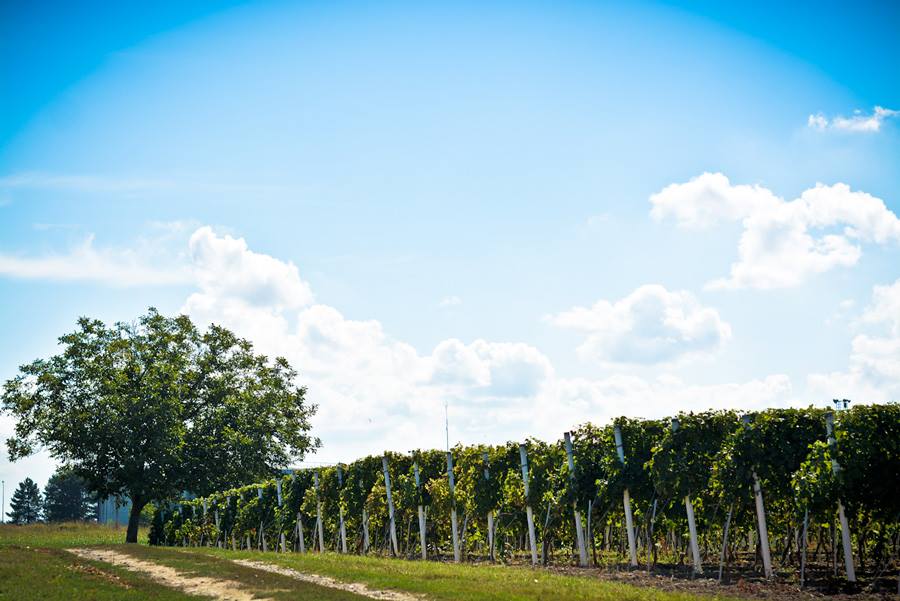
All this is part of the successful sports-entrepreneurial story of the Krešić family. Born in Vukovar, Dario Krešić, professional football player with an enviable career abroad and a former Croatian national team member, decided to invest some of his capital in his native land, open a winery and present Srijem wines around the world and in that way promote all of Croatia too. He held regular promotions of his wines abroad, and even arranged an export of wine to the United States. Dario did not forget where he came from, he could have found a home abroad and forget about Šarengrad, Srijem, Croatia.
I was greeted at the winery by Dario’s parents Franjo and Irenka. Dario was also in the middle of a cycling expedition; he was travelling from Zagreb to Šarengrad and was then between Virovitica and Šarengrad.
As Franjo said, since they are on the EUROVELO 6 route, cyclotourists often stop by.
“Recently two cyclotourist pairs from France came by, from Sochaux, on their way to the Black Sea. I welcomed them in the cellar with wine and domestic dry meat delicacies. I told them my son was once playing away in their town and they defeat the host team with 2:0. One of them told me he painfully remembers that match and that day is still a wound in his heart. It turned he was the owner of Michelin who is one of the sponsors of the club from Sochaux. He said that Dario defended the goal brilliantly at that match, French attackers were completely helpless, and then, out of nowhere he told me he would gift me new tyres for my car. He said I can choose to have them delivered in Belgrade, Zagreb, Split or Osijek. At first it was all so funny, as it turns out the world is truly small, a real global village, and at the same time I was exceptionally glad as I came across a man who appreciates sports players even when they play and defeat the club he finances. By coincidence at that moment the tyres on my car were by Michelin.
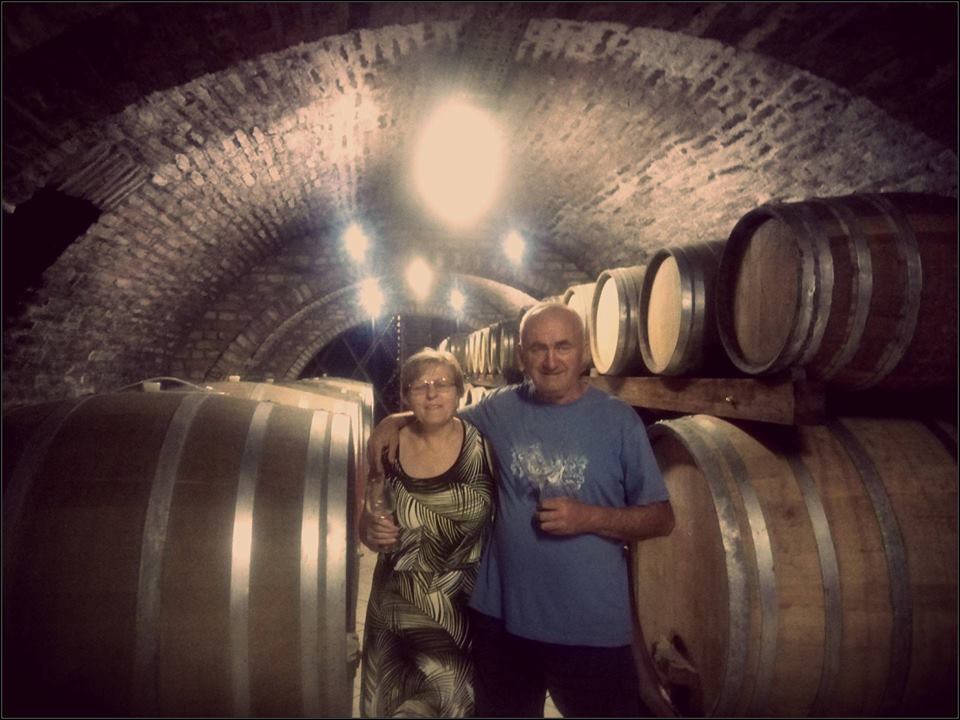
Father Franjo also runs the winery. And besides winemaking he is also a passionate hunter. He revealed they are expanding business and are set to produce fruit brandies and are opening a new wine store in Zagreb. A good portion of their wine is sold on the Adriatic, both in wine stores in Rijeka and Crikvenica, and restaurants on the coastline. At two restaurants on Brač Island the house wine is their Chardonnay. The price of their wines at the wine store is truly unionised, not to say ridiculous. For less than twenty kunas you can purchase an excellent Srijem wine, and the price of their bottles at coastal restaurants reaches triple digits.
Professional, and consequential financial success in football was not the only reason Dario decided to invest in the winery, but also experience from Trier.
“As refugees we were settled in Kumrovec. Dario played football the entire time at the local playground and gained attention with his talent. After we moved to Zagreb he began to play in the Mladost club in Buzin. At that time the younger generations of Mladost played in the same league as Dinamo. At one match Dario took a goal from Dinamo and that was ok. Coach Gabrijelić insisted on Dario transferring to Dinamo, and we refused from practical reasons; we lived on one end of Zagreb, and Dinamo was on the completely opposite end. This may sound funny now as Dinamo is our best club, but that’s how it was. Hrvatski Dragovoljac was closer to us so Dario joined them. They had just begun to put together their junior team. Dario had just arrived to Hrvatski Dragovoljac and was on the bench at a game they lost 19:0 to the Zagreb team. In the meantime, Dario began to actively defend goal and in the next return match they defeat Zagreb 1:0. Hrvatski Dragovoljac ended up as the third placed championship team, Dario began receiving national team invitations, first the U15, then the U16. At the U16 European Football Championship held in England in 2001, Dario played together with Niko Kranjčar, Janjetović, Grgurević and others and they won bronze. Thus began Dario’s professional career in SV Einracht Trier 05. Next came Panionios, PAOK, Lokomotiv, Mainz, Bayer Leverkusen. One of the main sponsors of Trier was the owner of a gigantic winery cultivating over 40.000 hectares of vineyards. He often invited club members for vineyard visits and it was there that Dario arrived at the idea to do something like that in his home town, known for superior wines, and certainly with better climate and paedological conditions for vines than the winery in Germany much further north than Srijem and Croatia. Several years went by and Dario began to truly invest in his winery. The first serious money he earned he spent in vineyards, equipment and winery building, and he could have spent it on luxury.”
Wine is aged in stainless steel, and a smaller part in barrels made in Đurđenovac. As Franjo said, he wanted to buy the barrels in Croatia and it was fortunate a barrel maker was still operating in Đurđenovac. Barrels were settled in the cellar over a hundred years old, completely renovated during the construction of the new winery. Along with the barrels a wine archive is located.
“Recently some guys from Imotski visited, on their way to Novi Sad for business. One of them boasted his father-in-law is a winemaker too. When I showed them the winery, they were shocked. He said his father-in-laws largest barrel was the size of my smallest one. He asked me if I have a daughter, and I said no. He said: “Too bad, she would have been a catch.”
Franjo recounted with a smile while showing me the control board displaying the temperature in each of the stainless steel barrels. We continued our conversation in the cellar with a superior Graševina from 2015. Sold exclusively in bottles. Then we tasted a solid Green Silvaner from the previous year. Franjo recalled the 2007 harvest with nostalgia.
“This is a truly least grateful grape variety. In 2007 we made a fantastic Green Silvaner. Not just us, but all the winemakers in this area. After that we did not manage to raise it to the same level in the cellar. It is a variety terribly sensitive to microclimate changes. But who knows, maybe 2017 will be a rerun of 2007.”
I have been to truly many wine tasting rooms, but it was only in the Krešić winery that I found a military bunker incorporated into the tasting room. It is a German bunker from World War II and it is so skilfully incorporated that its original purpose is not noticeable at first. Only the acoustics characteristic of bunkers and ventilation shafts (60 metres long) give away the truth.
“Two workers I hired spent over a month making an opening in the bunker. That concrete is so sturdy, it’s horrible. We once had guests from Germany and I told them that story. The German said: “Poor workers!” The original bunker constructors probably could not imagine superior bottles would be aged in it one day.
Wines of Krešić Cellars are of exceptional quality and have received many awards. Irenka and Franjo are especially proud of the champion title from Poland at the International Galician Wine Contest held in 2016 in Łańcut, where their Cabernet Sauvignon 2012 took the title. As Franjo said, since that competition has been taking place, no wine has received 92.33 points as their wine did. Second place went to the Frankovka Blue by the Tibava winery from Slovakia with 88 points, and the third place Limbach by the Neronet winery received 87.66 points.
“One of our winemakers from Pelješac received 82 points for his Plavac Mali at that competition. As for the number of sunny days, we can be compared to Hvar, this Srijem corner of Croatia truly has excellent insolation. All of this is recognised by caterers from the Adriatic and are deciding more for our wines as they can compete in quality with Dalmatian and Istrian, and are much more accessible in price.”
All their wines are excellent, but of the white varieties I was most impressed by the Traminer, and of the reds by Cabernet Sauvignon. Both varieties are characterised by a wonderful aroma, inviting you to enjoy the scent and associations it brings.
What to say in the end than to invite you to visit the Krešić Cellars winery and experience first-hand the Srijem wine rhapsody on the coastline of the mighty Danube and mellow slopes of Fruška Gora.

